#bern's original characters
Explore tagged Tumblr posts
Text


the last deadeye - molten gold
#the last deadeye#tld#the last deadeye art#tld art#bern#bernkastel#bernkastel zircon#episode cover#episode 0#molten gold#friends#friends ocs#fire genasi#fire elemental#dnd#dnd oc#dnd art#dungeons and dragons#dungeons and dragons art#dungeons and dragons character#dungeons and dragons oc#oc#original character#artists on tumblr#viioculi#my art#gallery
17 notes
·
View notes
Text


[original post date: 03/16/22]
meet sophie, my Cafe Crush oc!!
pls play the cafe crush demo if it fits into your comfort levels and interests, pip did such a good job on it <33
24 notes
·
View notes
Note
Folklore ask! Any stories on how the Greek mermaids got to be named after gorgons instead of any other countless sea or water spirits in myth? Does it have to do with princess Thessalonike?
I think this is actually a very complex story involving literature, oral tradition, the perception of creatures, women, historical figures and the meaning we apply to symbols according to our circumstances. This is a long story so there is going to be a Read More cut below.
First of all, Modern Greek has two words for the mermaid; γοργόνα (ghorghóna) and σειρήνα (sirína), so as you see both gorgons and sirens were conflated with the image of the mermaids at some point. In fact, the sirens did that first. I write "ghorghóna" in Latin characters to stress the change of the pronunciation of γ to a voiced velar fricative ever since late antiquity but otherwise the word is the exact same.)
Ancient Greek Mythology did not have a mermaid creature in the way we imagine it since the Middle Ages but the Ancient Greeks were aware of an ancient Assyrian deity who was imagined like that. This was goddess Atargatis who was known in Greek as Derceto. Greeks identified Atargatis / Derceto as the same with a mermaid goddess worshipped in Askhelon, somewhere in the north of modern-day Syria, according to Diodorus (1st century BC) but also Ctesias (5th century BC). The Roman Lucian confirmed this perception in the 2nd century AD. It is believed that to some degree this worship was known to Greece, especially during and after the Hellenistic period. For example, there has been a scripture found in Pella, Macedonia (<- coincidence?) dating to 206 AD in which the veneration of an Assyrian water deity is described.
The early Sirens of the Greek mythology (since 7th century BC) were depicted as creatures with the bodies of birds and the faces of women, who would seduce sailors with their beautiful music and singing. However, from the Classic period onwards there is scarce art depicting them with a fish body instead, maybe due to an Assyrian influence or maybe because the Sirens were creatures associated with the water mostly. They lived at the shore waiting for ships to pass and they were children either of River God Achelous or the Titan Oceanus or of Phorcys, son of Pontus (Sea).
A critical moment for the establishment of the siren as a mermaid in European minds might have been the book Physiologicus, written in Greek around the 2nd century in Alexandria. The book was a predecessor of bestiaries and was connecting various beasts (mostly actual animals but also a few mythological creatures) with the Christian doctrine by associating them with some trademark moral qualities they supposedly had. Physiologicus became very impactful and was translated to Latin, Armenian, Ethiopic, Syriac and later to Slavic, Old German and other European languages. I wasn't able to find what exactly was said about the Siren in the original Physiologicus, however the 10th century German copy Bern Physiologicus described the siren as half-woman, half-fish. Also, from the 7th century onwards western European books assert that the sirens are "sea girls" and are described as "having scaly fish tails". I did find a tiny image of a Greek manuscript of the Physiologicus and it has this drawing of the sirens, who indeed look a lot more like merpeople than half-birds:

Again, Physiologicus was very influential and the rest of the Early Christian tradition also explored the theme of the sirens extensively through the lens of morality. Early Christian documents discourage people to believe in the literal existence of sirens (fair enough) but they also shape their meaning into an allegory for prostitutes or any vile lustful women who are a danger for the moral male. In this context, the fish form gains more and more ground as well as alternative imaginings of the sirens as half-snakes or half-dragons. It should be noted that there are even imaginings in which the Siren has simultaneously fish and bird traits. The scaly look though, the picture of the siren ascending from the dark abyss instead of a feathery flying singer was more effective for the description of a destructive, dangerous feminine being. It is in the Byzantine period and respectively in the Middle Ages in West Europe when mermaids really become popular. In spite of all that, the bird version was not obsolete. The 10th century Byzantine encyclopedia Suda describes the sirens as half-birds.

Pages from Suda.
Let's go to the Gorgons now. The Gorgons were daughters of Phorcys, son of Pontus (Sea), much like the Sirens according to one version of their myth. They are too part of the general sea mythological sphere. They lived either beyond the edges or in Oceanus, in a hardly accessible rocky island. Their bodies were imagined as centaurs or wasps as early as in the 8th - 7th centuries BC but after that point they were imagined as humanoid, however sometimes they have snakes in their waist too or a scaly appearance or even wings, like we see happening with Sirens. All original accounts agree to a terrible old-looking repuslive face crowned with snakes. So does their name; Γοργώ (Gorgó) means "terrible looking, fearsome, terrifying". Despite that and before Ovid's popularisation of the Roman version of a victimized Medusa, the Greek Pindar already described Medusa as an incredibly beautiful woman in the 5th century BC. Pindar's take was influential and after this point ancient Greek art depicts a fairer Medusa. One can argue that Medusa typically looks scary but beautiful in pop culture ever since. In other words, as time passed there was some convergence in the way Gorgons and Sirens were imagined; the duality of being beautiful yet terrible and vile, sea creatures, feminine attributes, eventually a scaly look.
Let's make a pause now to talk a bit about Thessalonike and her tragic story. Thessalonike was Alexander the Great's half-sister, so named by her father Philip after an (undefined) victory against the Thessalians. Her mother Nicesipolis died when she was a baby and Philip died when she was a child so she was raised by Olympias. I would like to stress that there was a signficant age gap between Thessalonike and Alexander and there should not have been a lot of interaction between them. After Alexander's death, Olympias had still not married Thessalonike to anyone, favouring her own daughter first. Cassander, one of the diadochi, killed Olympias and Alexander's son and successor and married Thessalonike probably forcefully in order to get a better claim for becoming the King of Macedon. Cassander then named a new city he founded on the site of Ancient Therma after his wife. Thessalonike seemed to have influence over her three sons, especially after Cassander died, however when the first born Philip died, the second son Antipater murdered his mother, most likely because she favoured her third son Alexander to at least share the throne with Antipater while she was also serving as regent. I mostly wrote all this to make a point that the last person who was impactful in Thessalonike's life was Alexander the Great.
Around 338 AD there was an Alexander Romance attributed to Pseudo-Callisthenes. This book was supposedly recounting the life and adventures of Alexander the Great, however it was highly fantastical and inaccurate and became what you would call a liberal historical novel of sorts. This is where the origins of the legend of Thessalonike were. (What if there is some connection to the surviving veneration of the Assyrian mermaid goddess in Macedonia, just a century earlier?) Alexander Romance was a huge success getting translating into 25 languages in pre-modern times and reaching as far as Malaysia and Mali. This is certainly what greatly assisted Alexander to become a legend and hero even amongst foreign nations, gaining even their own local national traits. The original Greek version was so loved amongst the Byzantine Greeks that it got multiple revised editions, including some in which it was recasted in poetic Medieval Greek vernacular. It was one of these copies that the Latin diplomat Leo the Archpriest found in Constantinople in the 10th century and translated it into Latin, which made the Romance very popular in the west too.
Okay, we talked about the duality that the sirens and the gorgons had attained at this point as well as the survival of the interest around them due to the Christian theology. In Byzantine Greek the meaning of the word gorgo (terrible, fearsome) was still fully understood. In fact, in Byzantine Greek there was the word γοργόνη (ghorghóni) which addressed a horrible woman. It is also reported in the local dialect of Amorgos island. It is thus most likely that the shift of Thessalonike as "a gorgon therefore a mermaid" happened at that time and perhaps especially in the copies in the Medieval Greek vernacular and it was due to all this mix of influences.
You see, Thessalonike is not described as just any mermaid or even just like a plain man-eating siren. She appears to have two forms or two personalities in her. She swims in the seas waiting to find a ship and ask the sailors whether Alexander is still alive. In this state she is beautiful and calm and pleasant in her manners, which resembles the romantic view of a mermaid or the initial seductive state of a siren. If the sailors confirm that Alexander lives and rules and conquers the world, she remains this way and sends good winds to help the ship travel to its destination quickly and safely. But when the unsuspecting sailors say "But, Lady, Alexander died long ago!" then she changes and becomes what the Byzantine Greeks would call "ghorghóni". Her power is way more immense than to just grab a dude and eat him. She becomes huge and terrible and with the power of her tail she causes enormous storm waves which break and sink the ship and kill all the sailors. For this reason she was probably engraved in people's perception as a terrible Gorgon.

Here's the thing though: γοργώ (ghorghó) sounds an awful lot like another Greek word, γρήγορος (ghríghoros) which means "quick, fast". Those two are both ancient but etymologically unrelated. The fall of the Byzantine Empire and the annexation of the Greek lands by the Ottomans led to significant changes for the worse in the number of Greek people who had easy access to education and particularly education in relation to their heritage beyond this of the religion. Only select few that kept their riches or Greeks who then fled to the west had easy access to these things. In short, with more limited access to older forms of Greek or old Greek literature eventually γοργός (ghorghós) changed into a variant of γρήγορος (ghríghoros) = fast and its actual meaning of fearsome, terrible was forgotten. In these circumstances, the word γοργόνα (ghorghóna) which was used to address Thessalonike was now perhaps perceived as meaning something in the likes of "swift, agile and lithe" and it became associated with the positive mermaid form of hers. Eventually, the word γοργόνα was established as a generic term for the mermaid just like σειρήνα.
This happened because the legend of Thessalonike as a mermaid as well as the entirety of the Alexander Romance remained popular in the Ottoman period. The Byzantine copies were still circulating in the Greek population and in 1680 a Modern Greek version was printed with the name Φυλλάδα του Μεγαλέξανδρου (loosely translated to "Papers about Alexander the Great"). The book was written in the colloquial Demotic vernacular and it could be read by everyone (who knew how to read). This is how these stories spread and became oral tradition and folk tales. The romantisation of Alexander's character and by extension Alexander himself became a point of reference for their historical origins for both the Byzantine and the Modern Greeks.

The modern book from 1680 (yeah that's modern)
The true reason Thessalonike's legend remained so popular was not due to Thessalonike herself. Thessalonike was a minor historical figure for the most part and her interaction with Alexander was minimal. Some historians believe it was her son Alexander she was grieving for in the original legend but then he was confused with his much more famous uncle. I downright disagree. I believe the reason Pseudo-Callisthenes or the unknown authors and / or all these revisions imagined Thessalonike as the one grieving and wreaking havoc for Alexander was because of her being the name-giver to the city of Thessaloniki which by the ending of the Roman period and the beginning of the Byzantine period became very prosperous and gained a lot of power. Thessaloniki was so loved by Byzantine Greeks that it was considered as the Συμβασιλεύουσα (symvasilévusa) = co-ruler city of Constantinople. Thessaloniki remains the most loved city for the Modern Greeks too. After the unification of Macedonia and its largest city Thessaloniki to the already independent from the Ottomans south and central Greece, Thessaloniki became the "Συμπρωτεύουσα" (symprotévusa), the co-capital to Athens. It is also called Capital or Nymph / Bride of the North. Greeks damn sure love that city. This was a folk legend which connected the ever loved Greek city to a distant past.
Furthermore, the legend explores a theme that resonates deeply in the hearts of the Greeks across millenias. The allure and the danger of being a sailor, of travelling in the seas. The Greeks have always been seafarers. Losing loved ones to seas far away is a very common theme of Greek folk songs. The folk felt represented in this legend with the ghorghona representing the unpredictability of the sea. But this is also how Greeks developed an understanding for this dual creature, beautiful yet ruthless, yet also melancholic and temperamental. The ghorghona became a familiar concept, representing their loved sea and their loved city and their loved symbol of old glories (Alexander). Inevitably, she was "forgiven" of her fearsome qualities and the ghorghona became the beautiful mermaid of the Greek seas that you have to know how to talk to and earn her favor.
The ghorghona became a loved symbol of Greek folklore and she is featured in numerous modern Greek poems, artworks, short stories etc

Modern art by the prolific cartoonist and painter Bost (Chrysanthos Mentis Bostantzoglou, 1918 - 1995). All the national symbols are here: the Ghorghona as the beautiful mermaid, the sea, Alexander, the White Tower of Thessaloniki and the flags.




"The ghorghóna as the captains of old told her story." Modern Greek folk artwork. Look how she eventually becomes a postive emblem of Greece.
Due to the tight connection of the sense of ethnic identity with the Greek Orthodox Christianity for Byzantine and Modern - frequently occupied - Greeks, the popularisation of the ghorghona the mermaid was reflected in the Greek Orthodoxy as well .

Detail from a wooden templum in the Church of Saint Dionysius in Zakynthos (Zante) island.

Detail from the Chruch of the Great Archangels, Tsagarada, Mount Pelion. This templum was probably completed in 1749.
And because this was not enough of a "how to make an Evangelical mad" I guess, you know how saints in Orthodoxy are venerated and they are often imagined as patrons of certain groups of people or certain qualities??? Well...
may I introduce you to Virgin Mary the Ghorghona?


...who also became a novel?
Clearly, this is Mary imagined as Patron Saint of the sailors and those who travel in the seas.
In conclusion, there is not an exact moment in history that suddenly turned the gorgons into mermaids, however I tried to explain how in the long course of time there were many linguistic, cultural and religious points which ever so slowly contributed into changing the perception of the gorgon from an ancient, murderous, fearsome creature to a positive, beautiful (yet at times very dangerous) symbol of ethnic identity.
Sources:
Mermaid - Wikipedia
Atargatis - Wikipedia
Siren (mythology) - Wikipedia
The siren: a medieval identity crisis – Mittelalter
Physiologus - Wikipedia
Gorgons - Wikipedia
Thessalonike of Macedon - Wikipedia
Alexander Romance - Wikipedia
Η Γοργόνα Θεσσαλονίκη | Parallaxi Magazine
Φυλλάδα του Μεγαλέξανδρου - Βικιπαίδεια
Ο συμβολισμός της γοργόνας στη λαϊκή παράδοση της Ελλάδας μέσα από τη ποίηση και το τραγούδι
«Ζει ο βασιλιάς Αλέξανδρος;» Η γοργόνα και ο Μέγας Αλέξανδρος – ΧΩΡΑ ��ΟΥ ΑΧΩΡΗΤΟΥ
Ζει ο βασιλιάς Αλέξανδρος;
#greece#greek mythology#alexander the great#ancient greece#Greek#mythology#Greek language#modern greece#byzantine empire#greek culture#mermaid#greek history#anon#ask#thessaloniki#macedonia#mainland
59 notes
·
View notes
Text
Travel the World of Imagination: Journeys Beyond Border
Kieth Denmark M. Retes | BSIT1A OVERVIEW:
Switzerland originates from the Old Swiss Confederacy established in the Late Middle Ages, following a series of military successes against Austria and Burgundy; the Federal Charter of 1291 is considered the country's founding document. Swiss independence from the Holy Roman Empire was formally recognized in the Peace of Westphalia in 1648. Switzerland has maintained a policy of armed neutrality since the 16th century and has not fought an international war since 1815. It joined the United Nations only in 2002 but pursues an active foreign policy that includes frequent involvement in peace building.
Switzerland is the birthplace of the Red Cross and hosts the headquarters or offices of most major international institutions including the WTO, the WHO, the ILO, FIFA, the WEF, and the UN. It is a founding member of the European Free Trade Association (EFTA), but not part of the European Union (EU), the European Economic Area, or the eurozone; however, it participates in the European single market and the Schengen Area. Switzerland is a federal republic composed of 26 cantons, with federal authorities based in Bern. references: Switzerland - Wikipedia

Switzerland, a small yet influential country nestled in the heart of Europe, stands out in many ways. From its awe-inspiring landscapes to its unique political system, Switzerland offers a blend of natural beauty, cultural diversity, and global diplomacy that few other nations can match. Its distinct character is a product of centuries of neutrality, innovation, and a deep respect for its heritage, all of which contribute to the nation’s unparalleled reputation on the world stage.

One of the first things that captivates visitors to Switzerland is its breathtaking scenery. The country is dominated by the majestic Alps, with towering snow-capped peaks that attract adventurers and nature lovers from around the globe. Whether it’s skiing in world-class resorts like Zermatt and St. Moritz or hiking through verdant valleys and along crystal-clear lakes, Switzerland offers outdoor experiences that are hard to rival. Beyond the Alps, the country is dotted with picturesque towns, lush meadows, and sparkling lakes, such as Lake Geneva and Lake Lucerne, each offering their own unique charm. The country's commitment to environmental preservation further enhances the beauty of these landscapes, ensuring that they remain pristine for future generations.

Swiss culture is characterized by diversity, which is reflected in diverse traditional customs. A region may be in some ways culturally connected to the neighbouring country that shares its language, all rooted in western European culture. The linguistically isolated Romansh culture in Graubünden in eastern Switzerland constitutes an exception. It survives only in the upper valleys of the Rhine and the Inn and strives to maintain its rare linguistic tradition.
Switzerland is home to notable contributors to literature, art, architecture, music and sciences. In addition, the country attracted creatives during times of unrest or war. Some 1000 museums are found in the country.
Among the most important cultural performances held annually are the Paléo Festival, Lucerne Festival, the Montreux Jazz Festival, the Locarno International Film Festival and Art Basel.
Alpine symbolism played an essential role in shaping Swiss history and the Swiss national identity. Many alpine areas and ski resorts attract visitors for winter sports as well as hiking and mountain biking in summer. The quieter seasons are spring and autumn. A traditional pastoral culture predominates in many areas, and small farms are omnipresent in rural areas. Folk art is nurtured in organisations across the country. Switzerland most directly in appears in music, dance, poetry, wood carving, and embroidery. The alphorn, a trumpet-like musical instrument made of wood has joined yodeling and the accordion as epitomes of traditional Swiss music.
references: Switzerland - Wikipedia
64 notes
·
View notes
Text
things you never said (things you'll never say to me) - nico hischier

pairing: nico hischier x original female character
warnings: swearing, sadness, angst, not my traditional fluff folks, very little dialogue, kinda a ramble disguised into a piece lol, google translated german, projection?? is that a valid warning
inspired by + title: "things i wish you said" by sabrina carpenter
word count: 2.8k
author's note: got into my feels randomly for this (incredible) song and decided to write something with it. also a part of @wyattjohnston 's lowkey loverfest 2k24!! hope you all enjoy this melancholy ride and please let me know what you think <3
*****
Nico Hischier has always been a leader.
You ask anyone in Naters or Bern who knew him growing up and they would say the same thing — he’s a polite, young boy with so much talent and a sensible mind. He may be the youngest of three, but everyone’s always turned to Nico for guidance. With a calming voice paired with a warm smile, it’s rare for Nico to steer anyone wrong.
And he sees it in himself too. Even when he was a rookie, when the C stitched into his jersey was only a blurred dream, he still felt like he had to lead by example. No one was expecting that of him, he knows that now, but he was a first overall pick, the weight of a losing team’s hopes on his shoulders. If he crumbled, those supporters’ hopes fell with him. His own hope would fall with him.
It took a few years, a pandemic, another first overall pick, a shit ton of roster changes, a new coach and other things to walk into a locker room that wasn’t used to losing. And Nico prides himself as being a leader in that transition. C on his jersey or not, he would’ve done it. Because he doesn’t know how not to.
Leanna always said he didn’t know how to turn it off.
When Nico had first met Leanna Spritz, it honestly was one of the worst first impressions he’s ever given. It was the morning after a brutal 6-1 loss against the fucking Flyers. The final score itself was bad, but the fact that it was against the Flyers rubbed more salt into the wound. He knew Lindy was gonna bag skate them all to hell and back the morning after and he just really wanted his cappuccino before to take away some of the bitterness.
All up in his head, he had crashed literally into Leanna. Before they both could comprehend, her cold brew had spilled. Somehow, Nico got away with an unnoticeable splash on his hoodie and no spillage from his own drink. But Leanna wasn’t so lucky. Her brown sweater wasn’t dark enough to hide the fact that half of her cold brew was on it while the other spilled to the ground.
“Fuck,” Nico had exclaimed, eyes widening and darting between her now coffee stained sweater, the empty cup on the ground and her red hair that only glistened with the sun rays. “Shit! I am so sorry. That’s totally my fault.”
Leanna had waved him away with a small chuckle as she dug into her purse for stray napkins. Far too nice for someone who now had coffee all over them because of him. “It’s okay. Mistakes happen.”
Nico looked at his watch and grimaced. Shit. He was going to be late to practice. And that would be even worse than usual with their horrible performance the night before. “Listen. I really want to buy you a coffee to make up for my clumsiness, but I’m gonna be late to work and-”
Leanna had nodded in understanding, lips quirked up. “Don’t worry about it. Promise. Go. Don’t be late for work.”
He had been so frazzled that all he remembered doing was blurting out another apology before practically running away, partially from embarrassment but also because he really did have to go.
A week later, Nico went back to the coffee shop. In the back of his mind was the redhead who he still owed a coffee to. But Nico’s also realistic and he knew he’d probably never see her again.
While he was patiently waiting in the long line, he felt a tap on his shoulder. He braced himself to interact with a fan, but turned around and was pleasantly surprised by who he did see.
“I thought that was you,” she had said, pink beanie over her hair and a twinkle in her eye. “Not going to spill coffee again on me, are you? I’m wearing white today.”
Nico swallowed before his brain turned back on and he grinned. “Good eye. And no. I promise I’ll be less clumsy today. And I’m less in a rush.” They were next in line to order and he ordered first before turning to her. She had tried to deny him but he just raised an eyebrow until she gave the barista her order.
“I’m really sorry again,” Nico said as they had shuffled out of line to wait for their drinks. “I hope the sweater didn’t stain.”
Leanna waved him off with her bright smile. “That sweater has been through too much for some coffee to ruin it. You don’t need to worry, Captain.”
Nico had been shocked that she knew who he was, which, in hindsight, is dumb. He’s not Jack, but he gets recognized a good amount around New Jersey still.
He cleared his throat. “Nico is fine.”
She smiled. “Okay, Nico. Well, I’m Leanna. Thank you for paying for my coffee. You didn’t have to, by the way, especially to clear your conscience.”
“That’s not why-well, it is. But I also, uh, are you in a rush?”
Nico remembers that day so well still, his English failing him despite living in North America for over five years as he basically asked Leanna on their first date right there and then. He remembers being thankful that she took some pity on him with her sweet smile and led them to a table. He probably would’ve stood there stuttering like a fool if she didn’t cut in.
“Nico?”
Nico blinks himself out of his memories as Jack walks into his living room. Sometimes he questions if he should’ve given Jack a key.
“Hey. What’s up?”
“We have skate,” Jack gives him a look. “Dude, take a shower. Quickly. Or we’ll be late.”
“Right,” Nico says, stumbling over to the shower. As the water’s warming up, his eyes stop at a purple bottle tucked in the corner of the sink. Hair oil. Leanna always joked that she couldn’t live without it. His hands twitch to reach for the bottle just so he can smell the grapefruit scent, but he forces himself into the shower instead.
He can hear Nina’s voice so clearly. Throw it away, she’d say in their mother-tongue that realistically Nico will never not be fluent in but sometimes is scared will slip away. Nina liked Leanna a lot, actually, the one time they met when she came to Jersey to visit last year. But Nina is also Nico’s sister, and cursed her name many times when Nico called her crying, waking her up in the middle of the night. She had stayed on the phone with him for three hours, letting him cry.
He forces himself to take a shower. To wake up a bit and shift his focus to the upcoming skate and game tonight. They’re playing the Rangers, which is just always a grind. He needs to be all in.
Nico keeps to himself while getting ready for practice, putting on his gear quietly while his teammates chatter about something or another around him. He speaks quickly to the equipment team about his skates and smiles in thanks. He catches a whiff of the perfume of their head of PR as she walks past in the hallway, and Nico swallows.
Realistically, he knows it’s not the same one. But it’s floral and smells like jasmine, so it might as well be.
As he’s driving home, he has the radio down low. He was never the one to fuss about putting his music on in the car. Because the world just works like that, a song that he doesn’t know the title to comes on. He hums along, because Leanna always played this song.
Instinctively, his fingers twitch to reach out to someone who won’t ever be in his passenger seat ever again. He can hear her voice, her thigh under his palm. It’s not safe to drive with one hand, she’d say with an amused laugh interlaced in her voice. He would always roll his eyes before giving her thigh a squeeze and keeping his hand there for the majority of their journey.
He remembers that sentence bringing him comfort when they were driving to her sister’s house in upstate New York. He was scared shitless to meet her whole family for the first time to celebrate her cousin’s birthday. It was below freezing point outside, but his hands were so clammy that one would’ve thought it was summer.
Leanna had put her hand in his hair at the nape of his neck. He had immediately calmed down.
He swears if he focuses hard enough he can still smell the green tea shampoo Leanna used. It was always interesting to him, because the first thing he would think of when he saw her flaming red hair wasn’t green tea. It deserved something more bold attached to it. Like orange. Or vanilla. Or coconut.
Because Leanna was exactly that. Bold. Bright. Crashing into the lives of everyone in her path with her bright smile, loud laughter and a personality that sucked you in.
Nico stops at a red light and absentmindedly looks to the right. His breath catches at the sight of a woman walking a beagle. Leanna always said that once she was more settled down, a beagle was the kind of dog she wanted to get, just like the dog she had by her side throughout her whole childhood.
At one point, Nico had thought she meant settling down in Jersey. Never did she give the indication while they were together that she had meant London.
He couldn’t force himself to unfollow Leanna on Instagram after the break-up. He catches himself way too often seeing if she still follows him. She does. And she even likes his posts most of the time. He checks.
Nico shouldn’t be surprised. Even though she cried so much when they broke up and he couldn’t handle it, through tears, she wished him nothing but the best. Even as she was actively breaking his heart.
As he pulls into the parking garage for his apartment complex, he kills the engine and just sits there. He should be focusing on the game tonight. Focusing on how they need to stop taking stupid penalties. Focusing on their positioning in the offensive zone.
You think too much, honey. Leanna would say, kissing his forehead twice, something she started doing to calm him down. You just need to play hockey. Least that’s what you always tell me. Everything else will follow.
And he would never admit it out loud — especially to Jonas — but he still repeats those words in his head. He’s not sure if it works, but it’s like a mantra. A routine. And hockey players know more than anyone how important routines are and how difficult they are to change.
It’s been two months and three days. It’s annoying that Nico can still hear her voice in his head, clear as day. He hopes one day he’lll never be able to remember. But he also dreads the day that he’ll forget what she sounds like.
He walks up into his apartment and pours out a glass of water, downing it in one go. The sun’s out for the first time in two weeks, and a small smile spills on his lips as he admires the sunlight through his glass windows. His eyes shift to a spot on one of the tables by the window on the right, where it seems like something is shining. His curiosity takes over and he walks over, a reminder popping into his brain that he needs to dust his apartment. Why does dust accumulate so quickly anyways?
His stomach drops. One of her combs placed nonchalantly behind one of his plants. The shine is coming from the light hitting the red hair caught between the bristles.
What the fuck?
Nico closes his eyes and takes a deep breath before hastily grabbing the comb and tossing it into the trash. She never officially moved in with him, but she was around the apartment enough to leave some things lying around here and there. He thought he had thrown everything out. Or more accurately, he trusted Jesper, Timo and Jack to do it for him during a particularly bad Saturday afternoon two weeks after everything fell to shit.
He checks the time and sighs. He needs to nap or else everything will be thrown off. Checking his phone to make sure no one needs him, he plugs it in to charge by his bedside, ignoring a text from Nina he’ll answer when he wakes up.
It’s a text she sends a few times a week when she senses that her younger brother’s having a harder day. From almost 4,000 miles, she still knows. Nico’s always loved his sister, but he’s never felt more grateful to have her as he has in these last few months.
eins zu zehn?? ❤️
One to ten, it translates to. On a scale of one to ten, how shitty or good are you feeling about it today?
Nico sighs, responds back with a 6, and wills his mind to rest.
Somehow, he wakes up decently well rested to his alarm. He stays in bed a few extra minutes, getting his mindset ready for gametime. He chooses to wear the gray three piece suit tonight. One of his more fancier fits. It is the Rangers, after all.
It was Leanna’s favorite suit of his. She always joked he “ruined the look” when he slapped on his beloved white beanie. I love your hair. I wish you’d show it off more, she’d say.
He digs out the beanie from his clean laundry.
He always leaves an hour or so to himself before he has to go to the rink. He usually spends it tidying up or doing things around his place to clear his head so he can come back after the game and just crash.
Today, he replays the breakup in his mind. Or what he remembers of it, since he blocked a lot of it out.
When you picture your future, do you see me in it at all? He had choked out, holding Leanna’s hands in his for what was the last time.
It hadn’t helped that she had also been crying as she said her next words. Neeks, baby. It’s not you, it’s me. And I hate that I’m pulling that out, but it’s true. Maybe this isn’t the right time for us.
Why can’t it be? Nico had said. Why can’t we make it work?
Maybe in the future, if things are different. She had said, biting her trembling lip. But even then, Nico knew they were empty promises. She’s too stubborn of a person to not bend the world her way. She just doesn’t want Nico to be a part of that world.
It’s not fair, he knows that realistically, but oftentimes he wonders if she ever loved him at all. That thought especially rode his mind after he saw her post a story on Instagram earlier last week. It was clearly a soft launch, with her hand in the hand of some faceless guy over dinner. Nico ended up scoring two goals that night out of sheer adrenaline and anger.
Because all he’s ever wanted was for Leanna Spritz to be happy. Even now. Even after all of this. Even if it’s not with him.
But fuck, she’s clearly moving on. Why can’t he?
He blinks, collapsing on his couch in the living room and staring at the wall. The last time he heard from her was a month ago, when he had gone down after a rough hit during a game against Minnesota. He ended up only being out for the next two games, but the hit hadn’t been pretty. His chest had taken the brunt of the damage. Everyone, including him, had been relieved that it wasn't more serious.
While he was getting checked out by the trainers the next morning, his phone had buzzed and he almost threw up.
Leanna Spritz✨
I saw the hit last night. Hope you’re okay. Listen to the trainers.
Nico was angry. What right did she have to text him that?
But then, he just felt sad. That bottomless pit in his stomach opened up. He felt nothing but emptiness.
His phone buzzes, this time with a text from Timo, and Nico takes a deep breath. It’s game time. No more crying over his ex-girlfriend.
As he’s sliding on his beanie in the bathroom, he catches sight of the hair oil again. He picks it up, smells it, before throwing it in the trash. It lands on the bottom of the can with a final thud. He clicks all the lights off, makes sure he has everything he needs, grabs his key off the hook and shuts the door.
Two hours later, everyone’s getting hyped up. He gives a mini impromptu speech, Jack slaps his back way too hard and Nico smiles, dimples and all.
He takes a deep breath before his blades touch the ice.
#lowkey loverfest 2k24#k writes#hockey fanfic#hockey writing#hockey blurb#nico hischier#new jersey devils#nico hischier fic#nico hischier blurb#nico hischier writing#nhl#nhl writing#nhl fic#nhl blurb#nico hischier x oc
58 notes
·
View notes
Text
His Dark Materials Characters in Modern-Day England
Lord Asriel:
Tenured professor at Oxford
Invented a wholeass esoteric field because none of the existing fields suited his Vision™️
Has never given a student an A
All of his students have a crush on him. He knows. He doesn't give a shit
Almost gets fired once every week, despite his tenure, because he can't #beneutral
Outspoken about Palestine
Made a zionist colleague cry once, shrugged, and continued sipping his tea like nothing had happened
Was asked by the headmaster to make a formal apology to the colleagues he offended. Asked Lyra to put a presentation together for his "apology." Presentation was gen z memes that made the situation 10X worse
And that was the first time he actually laughed
Marisa
Visiting professor at Oxford. Originally a professor at Bern, Switzerland
Likes to remind Asriel that his lab equipment sucks and her experiments will always be better because she's actually Rich and not a sad excuse of an aristocrat like him
Hot chocolate? It's chocolatl, you simpleton
Keeps track of Lyra's scholarly accomplishments
Once threatened a colleague because they said they'd fail Lyra
Generally a bit too invested in Lyra
Has small moments of gae panik whenever Mary passes by
Tried to get Asriel fired. Not because she's offended by his ideology or because she necessarily disagrees with him; she just.... wanted him to get fired
Mary
Is canonically an Oxford professor in modern-day England
Calls students by nicknames
Brings snacks to the class
Barked a laugh at Asriel's presentation but quickly clamped her mouth shut and pretended nothing had happened
Is somehow never intimated by Marisa's glares
Smiles at Marisa. Knows Marisa is just a flustered gae so she's sympathetic
Says she doesn't have favourites but Lyra is her favourite
Lyra
Studies quantum physics
Of all her professors, she only likes Mary
The only reason she made that presentation for Asriel is because she's an outspoken pro Palestine supporter herself
Campaigns and advocates and Would Not Be Silenced no matter the cost (Asriel is high-key proud but would rather die than tell her. He expresses his appreciation by sneering and rolling his eyes at her when she does something brazen)
She and Will adopted a cat together
She also adopted a pine marten, much to everyone's horror
Is friends with the staff at her dormitory. And the security guards at her college. And the bakers and cooks and florists and that one shoe-shiner, but somehow doesn't have any friend with her in class
Will
Is cnonically from modern-day England
Studies medicine
Literally everyone likes him
Cat magnet
Study-a-holic, workaholic, good-deeds-a-holic
Organises fundraising events to support people in Gaza
Once hit a person. Police arrived. They apologised to him. Won a medal
Has major beef with Marisa
Boreal
Shows up every once in a while to stir some shit
Informant for the police
"Concerned citizen" (major Karen)
"Philanthropist" (takes money from people)
Billionaire (derogatory)
Zionist
The person Will hit
Asriel beat him up once too
Tbh everyone beat him up
Why is he still alive again?
He isn't; Marisa killed him
35 notes
·
View notes
Note
Is it too late for a fun fact? If so I’ll come back next week!
Almost! I was going to go to bed soon, but not yet! So! Today You Learned about the origin of Saint Bernard dogs!

Named after Saint Bernard of Menthon (NOT Saint Bernard of Clairvaux), who ran a guest house in Switzerland to help travelers--and it's still there, if you're curious. The staff there made a habit of breeding dogs. But they weren't originally rescue dogs, they were guard dogs. See, the guest house was built to protect travelers from bandits who often preyed on travelers in mountain passes, so the staff wanted big, tough dogs that could scare or fight off anyone who wanted to rob the guests. They worked out that the dog's hardiness made it a good rescue dog, though, and so it became that!
Dogs are not trained by the staff to rescue people, though; they learn their trade from the older dogs, weirdly enough. And they've been at it for centuries, adapting to slightly different roles. Apparently, the Saint Bernards helped deliver supplies in the Italian mountains during World War I?
The recent Pillar article that talks about this mentions the famous dog Barry, who apparently saved dozens of lives in his work (and his taxidermied body is on display in a museum in Bern). Another famous one was Rutor, who was the companion to Benedictine monk (and amateur scientist!) Pierre Chanoux.

Also! J.M. Barrie, author of Peter Pan, had a Saint Bernard named 'Porthos', after the Three Musketeers character.
10 notes
·
View notes
Text
FE6 Novelization Translation: Front Cover & Introductory Pages
If you would like to start from the beginning, read a missed part, etc., click here!
FE Game Script Translations - FE Novel Translations - Original FE Support Conversations
If you are interested in donating to support my work, please check out my Ko-fi here. Thank you!
———————————
This book is considered #3 in a 3 book set including FE7, so the chapter numbers will be 'Chapter 14' and onward. The first 13 chapters are FE7's 2 books.


Covers
Fire Emblem: The Blazing Blade ~ The Binding Blade
Turmoil in Elibe
Book 3
By Masaka Kazuyoshi
Illustrated by Kaneda Eiji
Published by Square Enix

Twenty years after Eliwood, Hector, and Lyn’s journey to save their country ended…
Disaster is once again about to visit the continent of Elibe.
Its fate is in the hands of Eliwood’s son Roy, and Hector’s daughter Lilina.
The tale begins yet again of a set of heroes who take up the current generation’s fight!
In this final book telling the story of Elibe in turmoil!





Color Art

Title Page
Fire Emblem
From “The Blazing Blade” to “The Binding Blade”
Turmoil in Elibe
Book 3

Table of Contents
Part 2: The Binding Blade
Chapter 14: Dawn of Destiny
Chapter 15: The Rebellion of Ostia
Chapter 16: The True Enemy
Chapter 17: Retaking the Capital
Chapter 18: The Binding Blade
Final Chapter: Beyond the Darkness

Continent of Elibe

Character Introductions
Fire Emblem
The Blazing Sword ~ The Binding Blade Book 3
Characters
Roy
[Lycian League・Son of Marquess Pherae]
Main character of the second half of this story. He returns home from his studies in Ostia to participate in the Lycian army in place of his sick father.
Eliwood
[Lycian League・Marquess Pharae]
Roy’s father and the main character of the second part of the first half of this story. Because of his illness, he is currently unable to fight at full strength.
Marcus
[Lycian League・Holy Knight in Service to House Pherae]
Roy’s instructor and a leading knight of House Pherae. Though he is getting on in his years, he serves tirelessly as the general of the Knights of Pherae.
Alen
[Lycian League・Cavalier in Service to House Pherae]
A knight from a distinguished family that has served house Pherae for generations. He is daring and honest.
Lance
[Lycian League・Cavalier in Service to House Pherae]
He is around the same age as his ally Alen, and the two are best friends. They are also equally matched in combat together.
Wolt
[Lycian League・Archer in Service to House Pherae]
Son of Roy’s wet nurse Rebecca (she appeared in part 1 of this story). Though they were raised together like brothers, he does not take advantage of his position, serving as a faithful servant to Roy.
Lilina
[Lycian League・Daughter of Marquess Ostia]
Beloved daughter of Marquess Hector. Roy’s childhood friend. She is cheerful, enjoys helping others, and has a natural talent in magic.
Hector
[Lycian League・Marquess Ostia]
Lilina’s father. Secondary main character of the first half of this story. As the marquess of Lycia’s leading territory, he leads the Lycian army into battle against Bern.
Bors
[Lycian League・Armor Knight in Service to House Ostia]
An exceptionally polite and kind person, even amongst the Knights of Ostia. He serves as Lady Lilina’s personal guard.
Merlinus
[Lycian League・Commander of the Supply Convoy Unit]
A government official who has served House Pherae since Eliwood became marquess. He leads the supply convoy unit, and guards the rear line.
Guinivere
[The Kingdom of Bern・Princess]
Younger half-sister of King Zephiel of Bern. To bring an end to her brother’s wicked ambitions, she flees alone to Lycia.
Elen
[The Kingdom of Bern・Guinivere’s Attendant]
A cleric of St. Elimine’s Church. She is entirely devoted to serving Guinivere.
Milady
[The Kingdom of Bern・Commander of Guinivere’s Personal Guard]
A female wyvern rider who has sworn her loyalty to Guinivere. After Guinivere suddenly goes missing, she works tirelessly to find her.
Dieck
[Mercenary Swordfighter]
A skilled mercenary with countless scars all over his body. He leads a small mercenary group. At Eliwood’s order, he lends his strength to Roy and his allies.
Shanna
[Knights of Ilia・Mercenary Trainee]
A cheerful girl training as a member of Dieck’s mercenaries to become a full-fledged pegasus knight.
Chad
[Lycian League・Orphan Thief]
The caretaker who raised him in an orphanage was killed by Bern. He becomes a member of the Lycian army to take his revenge.
Lugh
[Lycian League・Orphan Mage]
From the same orphanage as Chad. After his caretaker’s passing, he took the other children of the orphanage to Araphen to entrust them to a church of St. Elimine.
Rutger
[Sacae Plains・Mercenary Swordfighter]
After his home city of Bulgar was destroyed by Bern, he swore that he would take revenge. He is serving Marquess Laus of Lycia as a mercenary.
Clarine
[The Kingdom of Etruria・Daughter of Count Reglay]
Daughter of Count Pent of Reglay, an Etrurian noble house. She is selfish, believing that the world revolves around her and her brother.
Saul
[St. Elimine Church・Priest]
His church bestowed upon him the duty of locating the Fire Emblem. He has an aloof and easygoing personality, but also loves to flirt with women.
Dorothy
[St. Elimine Church・Archer]
Travels with Saul as his assigned guard. She has a serious and plain personality, and Saul is never far from her side.
Sue
[Sacae Plains・Nomad of the Kutolah Tribe]
Granddaughter of the chief of the Kutolah Tribe. Her tribe became scattered when Bern invaded. She is being held captive in Thria, one of Lycia’s territories.
Zelot
[Knights of Ilia・Commander of the Edessa Mercenaries]
A paladin who refuses to break his mercenary contract even after his employer’s passing, and continues to fight to save his daughter, Lilina.
Trec
[Knights of Ilia・Cavalier of the Edessa Mercenaries]
A member of Zelot’s mercenary group. He has a very laid back disposition, and often falls asleep on the battlefield.
Noah
[Knights of Ilia・Cavalier of the Edessa Mercenaries]
A member of Zelot’s mercenary group. He has a gentle face and personality, but also knows much about the true nature of the world, perhaps because of his line of work as a mercenary.
Fir
[Sacae Plains・Female Swordfighter]
On a journey traveling around each country, training to improve her swordsmanship. She meets Noah while testing her abilities at the coliseum in Ostia.
Larum
[?・Dancer of the Resistance]
A girl who gathers intelligence for the Resistance. After being kidnapped, she is saved by Roy and his army.
Echidna
[The Western Isles・Leader of the Resistance]
A powerful hero cares deeply for others. She leads the ragtag members of the Resistance, fighting against the Etrurian nobles who unjustly abuse their positions time and time again.
Elffin
[Strategist of the Resistance]
A figure wrapped in mystery, with grace and intelligence not at all befitting of a bard.
Bartre
[The Western Isles・Wandering Axe Fighter]
He knows of the Western Isle’s current tragic situation, and out of the kindness of his naturally chivalrous heart, joins the Resistance. He is searching for his beloved daughter, currently traveling to train her combat abilities.
Klein
[The Kingdom of Etruria・Son of Count Reglay]
Deployed as the Etrurian general stationed in the Western Isles. He was ordered by his superiors to subjugate Roy’s army, but he has doubts about the nature of doing so.
Thea
[Knights of Elia・Commander of a Pegasus Knight Mercenary Group]
A talented pegasus knight employed by Klein. Unlike her younger sister Shanna, she is serious and quick to worry about things.
Raigh
[Lycian Alliance・Orphan Dark Mage]
Lugh’s younger twin brother, who left on a journey to study ancient magic before Bern’s invasion. He is curious about the existence of dragons.
Fae
[Nabata Desert・Girl Living in the Hidden Village]
A young dragon girl who snuck out of her village, and follows around Roy’s army.
Cecilia
[The Kingdom of Etruria・Mage General]
One of Etruria’s three generals. She was once stationed in Ostia, and is an old acquaintance of Roy’s.
Perceval
[The Kingdom of Etruria・Knight General]
One of Etruria’s three generals. He has vowed his unshakable loyalty to the late prince.
Douglas
[The Kingdom of Etruria・Great General]
One of Etruria’s three generals. He fights to protect the king, ready to give his life for that duty if he must.
Zeiss
[The Kingdom of Bern・Wyvern Rider]
Milady’s younger brother. Stationed in Bern’s Western Army, commanded by Narcian.
Yoder
[St. Elimine’s Church・Bishop]
Ordered Saul and Dorothy to search for the Emblem, while he searches to discover what is true and what is false about Bern’s resurrection of dragons.
Niime
[Ilia・Renowned Master of Ancient Magic]
Known as the “Hermit on the Mountain.” Is deeply knowledgeable, even about dragons.
Juno
[Knights of Ilia・Wife of the Lord of Castle Edessa]
A Falcon Knight serving her husband Zelot’s position while he is away. She is also Thea and Shanna’s biological oldest sister.
Zephiel
[The Kingdom of Bern・King]
King of the militaristic country of Bern. Suddenly begins an invasion of Sacae and Ilia. Engulfs the previously stable continent of Elibe in a vortex of chaos.
Idunn
[The Kingdom of Bern・Dark Priestess]
A quiet young woman always by Zephiel’s side, serving him as if she was his own shadow.
Murdock
[The Kingdom of Bern・Leader of the Three Wyvern Generals]
Ordered to conquer Ilia as the commanding officer of Bern’s northern army. He has guarded Zephiel since his youth, and is his loyal servant who obeys his every command. (see book 2).
Narcian
[The Kingdom of Bern・Member of the Three Wyvern Generals]
A wyvern lord who invades Lycia as commanding officer of Bern’s southern army. A narcissist with a cruel and merciless personality.
Brunnya
[The Kingdom of Bern・Member of the Three Wyvern Generals]
A sage stationed in Sacae as commanding officer of Bern’s western army. Her heart is wavering in regards to following Zephiel’s wishes.
Galle
[The Kingdom of Bern・Wyvern Lord Assigned to the Palace]
A powerful soldier who serves as Murdock’s loyal retainer. Though he is originally from another country, his loyalty to Bern is strong. Milady’s beloved.
Arcard
[The Kingdom of Etruria・Governor Over the Troops Stationed in the Western Isles]
Abuses his position to force the pioneers of the Western Isles to work in the mines as slaves to line his own pockets.
Roartz
[The Kingdom of Etruria・High Chancellor]
A high noble who earns the title of next in line for the throne after the crown prince’s passing. Rumor has it that he is colluding with Bern.

Part 2
The Binding Blade
#fire emblem#fe6#fire emblem 6#the binding blade#fire emblem the binding blade#fe6 the binding blade#roy#japan#japanese#translation#novel#novelization#light novel#fe6 novelization translation
19 notes
·
View notes
Note
Hungarian historical chronicles about Hungary's legendary origins puts their own spin on the legend of Attila, but the way they choose to incorporate Dietrich von Bern is fascinating and makes me think the authors were working with some authentic folklore/literature tradition instead of making things up on their own. Dietrich, known as Detre of Verona, starts as a Roman vassal, much like the historical Visigoth Theodoric, but after Attila defeats him in the Battle of Zeiselmauer, he swears loyalty to Attila and helps him in his campaigns against Rome. One chronicle at least consciously swaps the names of Theodoric and Ardaric the Gepid, historically one of Attila's vassals, and makes Ardaric the one who dies at the Catalaunian Plains fighting for Rome while Dietrich survives at Attila's side. Other chronicles still mention Theodoric as a separate character, but also replace Ardaric with Dietrich. Historically, Ardaric betrayed the Huns after Attila's death and defeated them in a great battle, which might have contributed to the legend of a war between Goths and Huns found in the Norse myth Hlöðskviða. The general outline of that myth is actually used in the Hungarian rendition of Dietrich. After Attila's death, his son by the Roman princess Justa Honoria (who did write Attila a marriage proposal in real history), Csaba, splits kingship of the Huns with his brother Aladar, Kriemhild's son. However, Dietrich, Aladar's foster father/tutor, reviles Csaba as a foreigner's son and spurs Aladar to make war on him. The huge, destructive battle makes the Danube run red with blood for fifteen days. Finally Csaba is defeated and driven seek shelter first in Byzantium, then in the land of the Magyars, the Huns' sister tribe. If you read the Norse myth, you'll find Aladar as Angantyr, king of the Goths; Csaba as Hlod, his half-Hun older brother making a claim to part of the kingdom as his inheritance; and Dietrich as Gizur, the old foster-father who sends the brothers fighting each other.
In addition to being a wild ride where you can see old legends reworked in the process of nation-building, these chronicles lend a bit of support for my Dietrich and Kriemhild/Gudrun as platonic best pals idea. Imagine them being so close that she trusts him to foster her kids.
You know, while reading this I had half a mind to talk a bit about the Goth/Hun war motif in the Saga of Hervor and Heidrek... but it seems we'd already had the same thought. ;)
I'm really not very familiar with Hungarian chronicles, tho it absolutely makes sense that they'd spend a lot of time of Attila and related legendary traditions, so maybe I should start looking into them. So, thanks for mentioning this!
And Dietrich fostering Kriemhild/Gudrun's children sound like such a sweet idea, too.
12 notes
·
View notes
Text
What is the relationship between witches and their human selves in Umineko? Thinking about that today. (Also has Higurashi spoilers.)
The first thing to look at should be the simplest: Bernkastel. Bernkastel is only associated with one human self, Furude Rika. In Higurashi, Rika is shown to sometimes act as her "witch self": this is her "self" which holds the trauma and knowledge of all of her loops. In Saikoroshi, Rika feels entirely divorced from the human Rika she was meant to be, 'the Rika of this fragment', and feels like she is no longer Rika, but the witch, Bernkastel. Contrast this with the end of Matsuribayashi, where Bernkastel seems like an entirely separate entity to Rika, speaking as though Rika is someone else and going on in the world of Fragments.
We know that Rika is on the "gameboard" in Hinamizawa celebrating her victory with her friends, but the witch-Rika, Bernkastel, is still trapped in the loops/scenario, toying with possibilities - the traumatized part of Rika that was left behind.
Rika embodied and was Bernkastel, and Bernkastel originally was Rika, but ultimately, Rika and Bernkastel have become separate existences. We can see callbacks to Rika in Umineko, like when Bernkastel names her piece "Furudo Erika" (a riff on Furude Rika), and we can see that Bernkastel is still affected by what happened to her as Rika from her response to Erika mentioning it in EP6.
Since I've brought up Bernkastel, I should also discuss Lambdadelta. Thanks to SotsuGou, people primarily associate her with Satoko nowadays, but she actually bears resemblance to two Higurashi characters: Takano and Satoko. For example, her eyes were originally yellow, and she also has a side story showing her interactions with a child who wanted to become a god - Takano. It's also mentioned that she lost a game against Bernkastel in the past (which Takano did, though as of SotsuGou, Satoko has as well). She lays a trap for Bernkastel in another side story, which links her to Satoko, and she has red eyes in other versions of her sprite, which link her again to Satoko.
However, Lambdadelta is never confirmed to have been born from Satoko or Takano, despite her connections to them. I can't really speak further on her relationship with them as human-to-witch-self without assuming one or the other or both.
Then there's Featherine, who seems to be a mixture of Hachijo Tohya and Ikuko. She has Ikuko's appearance, but also uses Tohya's name. As the witch-author of the story, she likely comes from both of them. Her primarily being based off of Ikuko in terms of appearance and personality may arise from Ikuko doing most of the writing, or from something in their relationship (interpersonal or as writers).
However, she often seems to show feelings that may come from Tohya, such as her kindness towards Ange in EP8. And yet, this contrasts her cruelty at the end of EP6/in EP7. This likely comes from her existence being based off of two different people: she is the witch born from the author 'Hachijo Tohya', who is in truth both Tohya and Ikuko. She is a single entity disguising two people.
Featherine's given backstory is that she sleeps for long periods of time, only to be revived by a new story. She is Bernkastel's master who taught her how to "eat meat" (likely, to cannibalize stories for entertainment, rather than being part of a story), and Bernkastel also revived Featherine at one point. Featherine is also connected to Hanyuu by Eua in SotsuGou, who appears to be similar to her. However, there is no known connection between the humans here, only the witches.
This can have various reasons:
The simplest is that Higurashi and Umineko have the same actors in different roles. In Higurashi, Bernkastel may have been born from Rika, but in Umineko, Bernkastel is born from Ikuko's cat, Bern. The links between the two Bernkastels are fun easter eggs without much consequence, and the same goes for any other cross-VN relations or connections. This is also the most boring answer, in my opinion.
Another is that, even if Higurashi and Umineko have both taken place in the same universe, that does not mean that the Hinamizawa and Rokkenjima gameboards exist in the same universe. Higurashi in the world of Umineko might be a story that Ikuko wrote. It is possible that Hanyuu was a character she projected a lot onto, as a woman who was rejected by her community, killed by her husband, and now clinging to the companionship of her descendant, Rika. Ikuko herself was exiled from her family, removed from the outside world, and was very lonely. The story was abandoned, but somehow Bern, her cat, gave her inspiration to finish it: thus Bernkastel the witch, a mixture of her cat and her character, Rika, was born and had saved Featherine. Some other explanation of events may also serve to connect the characters together.
Overall, however, regardless of reasoning, Featherine seems very disconnected from Ikuko and Tohya. Part of this may be due to the additional layer that Featherine is in the story, while Ikuko and Tohya are alive, human writers that exist outside of it.
This is very different to the close, interwoven relationship that Eva and Evatrice have. Evatrice is separate from Eva, but in the sense that Evatrice is Eva's childhood trauma and discarded dreams personified as a witch. They share a body on the gameboard, and are only fully separate in EP8. For them, there is no full separation or denouncing of them as Eva: they are both Eva, just with a focus on different parts of their lives.
I also want to mention Ange: her final transformation into the "witch of the future" at the end of the story coincides with the 'death' of Ange, and her rebirth into Yukari. Ange was a witch, but in order to live on, she is reborn into Yukari who is a 'white witch' and an author that brings happiness to children. She leaves behind her old identity while still carrying the memories of that time (as evidenced by her emotional reunion with Tohya). However, up until this point, Ange as a witch had no separation from Ange as a human. Maria and Battler are similar: they become their witch-selves, with no separate human self remaining (except, in Battler's case as a higher-level witch, for his gameboard/piece self).
...Technically Virgilia is a witch, but she is one made by a fantasy conception of her, rather than Kumasawa's own decision to become a witch. There isn't much of a relationship to be had.
I saved Beatrice for last for a reason.
Some people consider Sayo to have become Beatrice, given the events of the Confession chapters of the manga. However, there is also room to interpret them as similar to Bernkastel and Rika's relationship, where the witch and human were once one, but have since separated.
For example, Beatrice's red truth that the sin Battler committed wasn't against her, as well as her discussion with her piece-self (Sayo) in EP4, promising her that she will take care of everything, may indicate that Beatrice does not feel that she is 1:1 with Yasuda Sayo.
Another thing to consider is Sayo's conception of herself: she speaks of the world as though she is like a director or god, distinct from it. "I'm modifying the world so that Beato is me." "I'm done acting the part of the servant." Sayo herself doesn't appear on the stage: only Beatrice does. Her personas (Beatrice, Kanon, Shannon) are the only versions of herself allowed to appear. She also narrates separately from the trio in EP7 - "Then, Beatrice. From now on, you will carry the bud of love. In other words, the role of being infatuated with Battler and waiting for his return will go to you."
Much like Rika, Sayo embodied Beatrice, considering her to be a secret "witch-self" separate from her "daily-self". However, Sayo did not even consider her "witch-self" to be herself completely, instead speaking of Beatrice in the third person. In that case, where is Sayo, if she is not Beatrice (and certainly not Shannon or Kanon, who are also explicitly created by her)? She refers to "us" (all three personas and herself), indicating that her "true self" is none of the three, but separate.
In that case, with Sayo holding themself to be separate from Beatrice, Shannon, and Kanon, can Beatrice really be said to be Sayo, and Sayo to be Beatrice, rather than the relationship of "Beatrice was once Sayo" that Bernkastel seems to hold with Rika? Is it more of the enmeshed relationship that Eva has with Evatrice? Or is it the disconnected relationship that Featherine, as the author-avatar, has with Ikuko and Tohya?
If we go by Confession's depiction, Sayo's truest self is Beatrice, as she becomes her within the catbox and acts out the role of Beatrice. But if we go by EP7, Sayo doesn't seem to align with any of her personas as a truest self, even Beatrice. All three of them are acknowledged as separate from Sayo, which fits with all three of them existing separately within the catbox. Sayo did not directly or fully "become" any of the three, so all three hold equal status as 'furniture' that need a soul to become real and to be loved (see: the EP6 love duel).
Since the two depictions appear to conflict, I would say that both of them (and all others on this spectrum) should be permitted in the catbox.
Witches seem to have varying relationships with their human forms. Are they cocoons they were nurtured in and they left, or are their human selves still an important of them, witch and human interlinked? Or do they distinguish themselves so much from their human forms that the connection is difficult to see? However, their human selves always shape their past and who they are now. There is no fully severing the connection between reality and fantasy.
#umineko#umineko no naku koro ni#umineko spoilers#higurashi spoilers#sayo yasuda#rika furude#this could use more polish but fuck it we ball#a lot of people feel like witch/human is very 1:1 but there's a lot of times where that isn't the case
16 notes
·
View notes
Note
Please I would love to hear more umineko thoughts from you
oh my god you should NOT have asked. i'm on episode eight but i have so many. do NOT read this if you haven't read umineko, you HAVE to go through the experience completely unspoiled. tw: incest, christianity, death, but none in a positive light
my most recent thoughts have been provoked by the riddles in episode 8 and how kyrie and rudolf had just told eva they do not fault her for any harm she caused ange. it strikes you as odd at first, because they would never say that, but then you realize two things: this is very similar to the golden land and this is battler's chessboard. battler already knows about sayo and what she wanted from his as beatrice, what she wanted from everyone as beatrice: recognition. she is a girl who used to follow god's tests so blindly and has sinned so badly. she wants people to see her innocence, know of the sins that harmed her, forgive the sins that she caused herself. that is, at the end of the day, what everyone wants, and battler is treating everyone like it, in honor of beatrice. this is a very difficult topic for me to see in media. the idea that every person, no matter how horrible their actions and nature, has a heart and wants forgiveness, is something i can't accept because i, too, am human. what would i be if i forgave and understood everyone? what would i be without hate and revenge and a personal view on things? if i accepted everyone's truths, there would be nothing of myself left. but the idea is true, and i have to know it deep down, tame it carefully.
my thoughts overall, though? i could never put them in one single post. this novel is amazing in many ways - it's a love letter to an entire library of books, it's a love letter to love, but there is also no good love in this story. there is fake love, true love, great love, but there is no love that is good, normal, because the ushiromiya family didn't have it in the first place. kinzo built this family on blood-stained gold and adultery. this family is like a locked room itself in many ways (god, they even represent it with the incest), and nothing good ever happens in a locked room. while i haven't yet reached the end of episode 8, i hope they all die. i hope ange never really survived the fall from the building, actually. i hope it ends, i hope the room exploded and there is nothing left of the ushiromiya family now, not of the gold, not of the love, not of the anything. it probably won't be like that, though. bern promised there wouldn't be a happy ending.
sayo's story is the greatest story i have ever seen a character have, no joke. "greatest" as in enormous in it's tragedy and richness, an endless universe collapsing in on itself because it can't, of course, exist with just one person. of course she did everything wrong, nothing right has ever been in her nature.
i also loved the biblical symbolism, of course. how could i not. the figure of god specifically is something so subtle i almost missed it, but at the end of the day, three girls share that imaginary friend - sayo, maria and dlanor. for all three, it's their father/authority figure/commander in different ways. sayo ends up burning kinzo again and again, commiting rightful patricide, and also essentially rebels against god by giving up on his test and befriending demons. it's a nice touch. i have my own issues with the demon summoning (i dabbled in the occult long before playing umineko) but it's just a technicality.
anyways, serious stuff aside - loved the toxic yuri, loved the fuckedupedness of it all, loved the fact that the narrators are NEVER reliable and you shouldn't listen to the game, like, at all, but also you should. i was frequently theorizing about the origins of beatrice during my playthrough and talked to my friend about it, who had already finished umineko long ago. at a point of episode... 6? 5? i basically said "fuck this, i'm not even going to try. shannon is beatrice, shannon is part of beatrice, kannon is beatrice, fucking everyone is beatrice. i give up" and it was really hard for him to, like, be normal. thank you [REDACTED] for not spoiling anything. i am on my way to finish episode 8 and obsess about the music forever.
#umineko#umineko spoilers#umineko naku koro ni#umineko when they cry#wtc#when they cry#beatrice the golden witch#beatrice umineko#shannon#sayo yasuda#kinzo ushiromiya#maria ushiromiya
46 notes
·
View notes
Text
Welcome to UNDERTEAL!

UNDERTEAL is an UNDERTALE Fan Project dedicated to telling the story of other humans that had fell before Frisk! However, instead of there being one...
There's two!
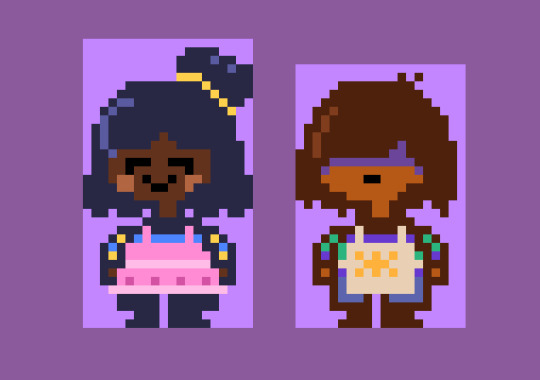
Coren (Kindness, Left) and Berne (Integrity, Right) are two human children to decide to climb MT. Ebott together after a dare from a friend. Berne leads the party and Coren mostly just follows along, but they're inseparable!
What situations may they find themselves in while trying to find their way home? Who knows!
This Fan Project is still in the very early stages of development, so please note that it will take a long time!
QUESTIONS THAT WILL PROBABLY BE FREQUENTLY ASKED
Q: What medium will this Fan Project be in? A: Fangame, but that means that this will take a very long time. Please be patient!
Q: Why is the Fan Project called UNDERTEAL? A: Green and blue make teal! Also funny pun anagram.
Q: What are Coren and Berne's genders? A: They're both non-binary and go by they/them.
Q: Is this connected to UNDERTALE: Yellow? A: Nope! This is a completely separate Fan Project, sorry!
Q: Will UNDERTALE's original Main Characters be in this? A: Other than Toriel and Asgore, no. There will be multiple new main characters Coren and Berne will encounter.
Q: Who runs this project? A: @iceespizza! AKA, the person who made this post!
Q: Is there anyone else working on this project? A: No, but I'm open to the idea if I really need help!
That should be all the questions that people might ask! Well, that's all for the pinned post! Thanks for reading it!
19 notes
·
View notes
Text
Notes on "Ambidextrous Angle" here
Notes on the flowers in ep.8 here
Notes on the colors in ep.10 here
Notes on the numbers on the car plae of No.3 and KMC here
Is justice really blind?
In the drama we have been introduced to the "Lady Justice" several times by now and she in fact takes a very important role in it, even if only in the background.
And throughout the drama, there are a handful of scenes where the characters question "why is she blind(folded)" and we also see pictures of her in KSJ book which depicts her blind version. We can see this very clear by one of the last scenes in ep.8 where KMC picks up the book from his table and flicks through the pages followed by a flashback of KSJ saying "This always bothered me. Lady Justic wears a blindfold because she's afraid of bias in decisions"
But is this really historically and mythologically accurate? Was "Lady Justic" (who btw goes by so many more names) really blindfolded? And if so why?
This post while explain:
The location and date of build of the Lady Justice depicted in KSJ book
Why the location/date is important
Depictions of Justitia
What did she really look like? What are her origins?
The meanings of her three (Actually 5) distinct features
How does it relate to the drama?
First of all, lets adress the Lady Justice' depicted in KSJ book. On of them- the one circled- is a statue of her located in the Old Town of Frankfurt am Main, Hessen, Germany. Below, there is a better photo of her exact location.


The Justitia statue fountain is a fountain called the "Gerechrigkeitsbrunnen" sculpted by Friedrich Schierholz in 1887. Its a replica of a fountain sculpted in 1611 (which again, was also a replica of a fontain built in 1543). The 4 virtues depicted below Justitia are:
Iustitia (Justice)- with sword of judgment and balance.
Temperantia (Control)- Moderation, distributing a liquid between two pitchers.
Spes (Hope) with a dove on her arm.
Charitas (Charity) with two children, one of whom she is breastfeeding.

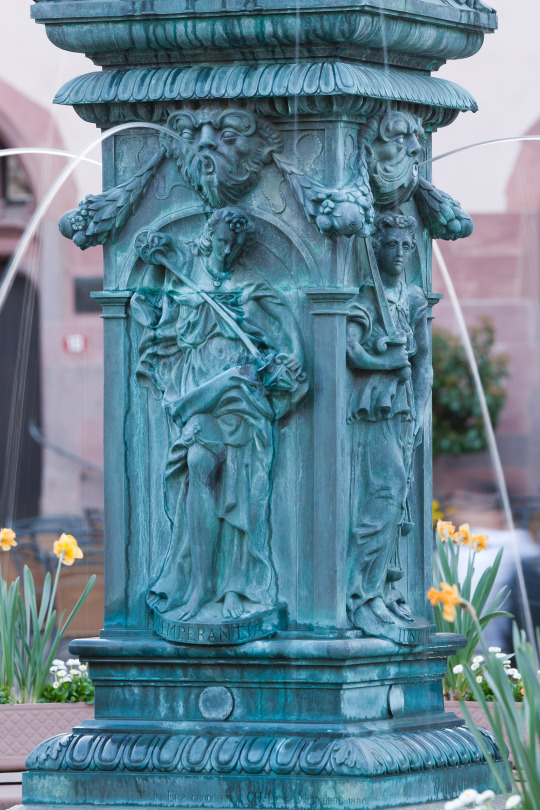
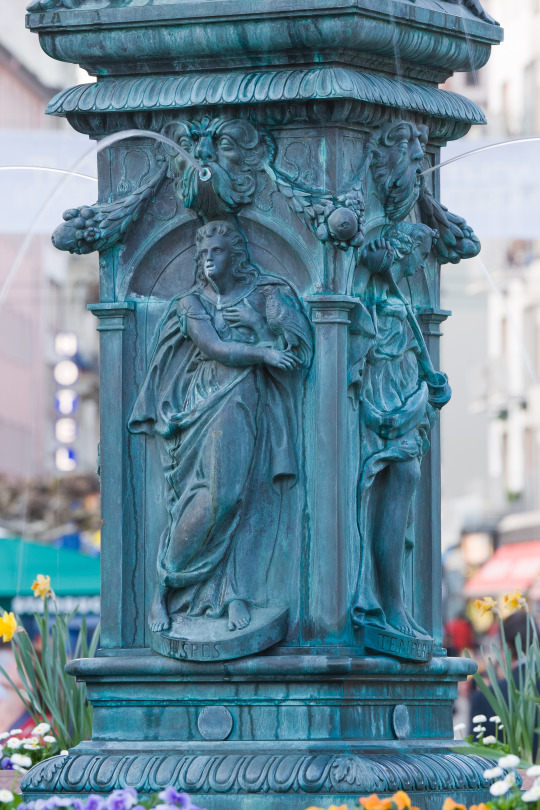
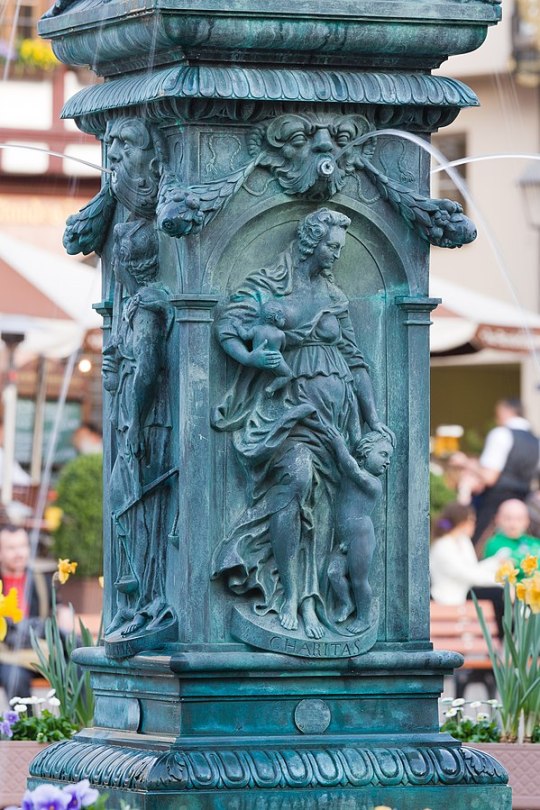
Why is the exact location or more date when she was built important to the question of "Is she really blind(folded)?"
Because, when the fountain was build, only then the whole myth of "Justice being blind" started.
It actually dates back to the mid 15th century where it first started as her being one eyed, then suddenly she was blindfolded. And the first known representation of her being blind is Hans Gieng's statue on the Gerechtigkeitsbrunnen in Bern, Switzerland built in 1543.
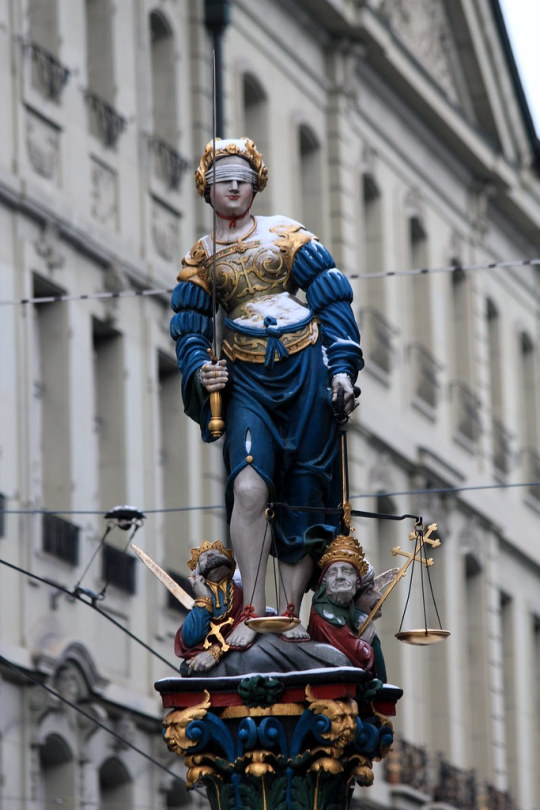
Different depictions of Justitia throughout the years/centuries.
There exist several renditions of her and they all changed over time. One source tells about a mortuary temple in egypt, honoring Pharao Ramses the Great. And it is said that in this temple there is a scene depicting judgment wher the associate judges had no hands and the presiding judge had closed his eyes. And from this, another depiction of Lady Justice developed in the middle ages: Justice, depicted as a woman, blindfolded and without hands. The sources then say "she has her right eye closed so that she doesn't recognize neither friends or rich people. And she has her left eye closed so that she doesn't recognize the poor and enemies (of the judge). With it, she doesn't judge by personal bias. And she doesn't have any hands either so she cannot accept bribes."
Which means, two versions - Justitia without hands and blindfolded, and Justitia with hands and blindfolded- coexisted then at the time.
In the late middle ages, both depictions started to merge. But this bears the question: If no hands, how can she hold the scale and the sword? In one of the older depictions of the "Combined Justitia" in the Lawbook of the City Eisenach, Thuringia, Germany- there she is with only one arm, holding the sword, while the scale is placed on the stump of her arm. At the same time, one of her eye is covered while the other isnt.
This later resulted in Lady Justice being blindfolded on both eyes.
But why was Justitia suddenly blindfolded? There is no exact answer to this question, only theories. One says "it seems to have been added to indicate the tolerance, or ignorance to, abuse of the law by the judicial system."
But how did roman/greek Justitia originally look like? What are her general origins?
"Lady Justice" was originall not blindfolded (and also not blind), and because of her "maidenly form" is supposed to guarantee her impartiality which renders the blindfold completely redunant.
In original iconographies of the ancient roman times Justitia was never blindfoded. She only held a sword and as scale, wore something akin to a crown and her Toga (more on these things down below)
Her origins date back to the ancient roman time (or greek, if we follow her greek counterpart Dike) and roman mythology where she was introduced by the emperor (Caesar) Augustus- and thus not a very old deity of the roman pantheon.
Justice was one of the virtues celebrated by Augustus in his "Clipeus Virtuis" (lat.: Shield of Bravery)- a temple of Iustitia was then established by in Rome by emperor Tiberius on January the 8th, 13 BC.
In roman mythology she only plays a role in one part which is the myth of the "Golden age" (based on the greek myth by Hesiod in his poem "Works and Days"). Here Justitia, identifying as Astraea, is the last of the celestials, leaving a "crime-filled earth" of the iron age to return to her supernatural homeland. Other sources say, she gets transported to the sky as the constellation of the Virgin.
She finds mention in the greek term "Dikaiosyne"- There she is counted by some priests as the one of the cardinal virtues.
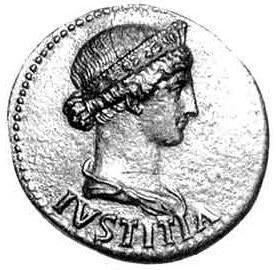
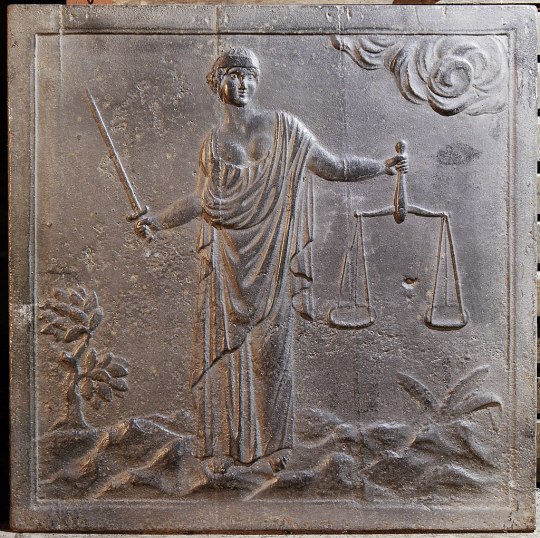
What does the scale, sword, crown, toga and blindfold represent?
The scale: represent weighing facts and evidence to decide a verdict. It also shows her duty to restore balance to society
The sword: represented authority in ancient times, and conveys the idea that justice can be swift and final.
The crown: its represent authority and strength
The toga: a Greco-Roman garment which symbolizes the status of the philosophical attitude that embodies justice.
The blindfold: Is intended to show Justice as blind to the injustice carried on before her, but it has been reinterpreted over time and is now understood to represent impartiality, the ideal that justice should be applied without regard to wealth, power, or other status.
So, how does it relate to the drama?
Its really nice to see a drama actually diving deeper into the meaning of her, especially questioning her role in the whole judicial system and why she looks the way she looks (also, the dramas focus on her in general is really nice- shes basically omnipresent all the time): Just like the drama, she is a rather ambiguous figure. Her appearance changes for who ever looks at her, her symbolism changes for who ever looks at her. For some, she is justice, for some she is nothing more than a chess figure.
(fun fact: i was able to figure out where the fountain is located not by the statue but by the small bit of the rooftops we see in the photo. umm... a german doing what we can do best: recognize german architecture haha)
Also, who ever has not yet looked at @onomatopagu-et-cie threads on this drama should definitely check them all out ♡
23 notes
·
View notes
Text
Umineko EP8 Tea Party, ??? and End
Featherine is writing and starts talking about when is an appropriate time to finish a tale, remarking that this kind of tale should probably be left in a cat box. Bernkastel is sewing Lambdadelta back up in very sexually charged language, Erika comes to the room, Bernkastel reveals Dlanor is still in touch with her, LambdaBern flirt some more and Erika gets jealous.
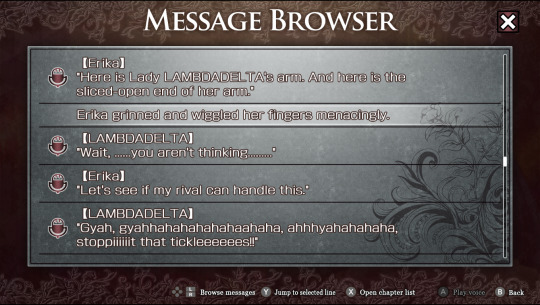
Gertrude has earned a promotion, Cornelia is learning martial arts. Will is.... a landlord who plays Badmington with Lion. Dlanor is still hard at work. Lambdadelta and Bernkastel promise to see each other when something else cries.

I think I mentioned it before, but one of my goals for this replay was to have a deeper appreciation for Bern and Lambda. I played the game originally as my first WTC game so I was constantly like, "Well that's definitely hinting at something I don't get". On replay, I appreciate them a lot more and I think reading their lines also gives you a lot of understanding towards other characters, as well.... a lot of scenes are even further contextualized by GouSotsu. If you don't have the context for Higurashi it is very easy to villainize Bernkastel a lot and not understand her as anything more than evil, which I think is a disservice for any Umineko character. I also appreciate Erika a lot more, she feels kind of like a tertiary main character of the answer arcs haha, I mentioned it a lot but I really do pity her a lot and I do kind of hope for better for her anyway. Meanwhile....

Sakutarou is now famous, and also Ange I guess. Or Kotobuki Yukari. Ange is spending her life writing books, hoping to help more children find magic and happiness. Then the name Hachijo Tohya gets brought up... Ange remembers how Hachijo's refusal to reveal the truth ultimately led to the Rokkenjima Mystery to die down, and thanks her. Ange agrees to meet with Hachijo and it is revealed that Hachijo is 2 people.
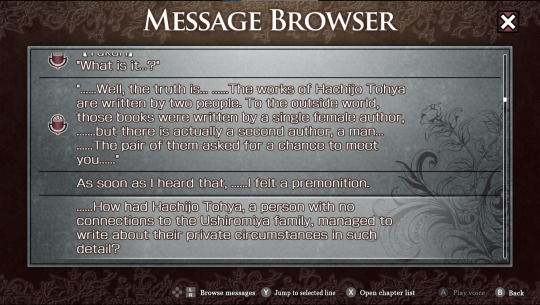
Ange doesn't really know how to deal with the reveal Battler is "Alive", other than shock. Happy he's alive though. She mentions how if it happened at another time, she would probably be pissed he hadn't shown himself up earlier, but right now she's just happy the miracle happened. Battler confirms what we saw at the very end of ep8, and Ange seems to blame herself for the reunion taking so long, due to her changing her name. But then she thinks about how she did try to meet with Hachijo once and was denied, but then instead of blaming anyone decides to just thank God for the miracle. I am so happy to see Ange so.... at peace. But Hachijo and Tohya reveal that they were perfectly capable of meeting her before, which throws her for a loop, and starts getting actually angry. Tohya explains how he has Battler's memories, but isn't Battler.
I forgot Tohya tried to kill himself, damn, considering Sayo's own issues with identity I can imagine writing the forgeries also helped him cope with his own fragmented identity....

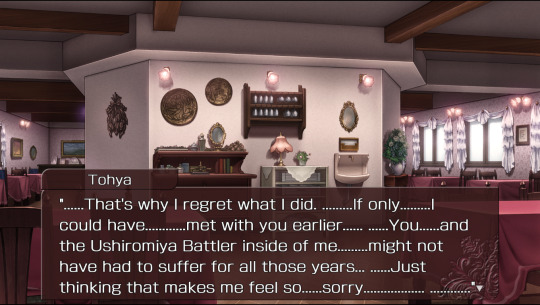
Those tears are so pained... I want to cry. Ange accepts that Battler is both dead and came back to her, and is doing her best to hold herself together for Tohya.
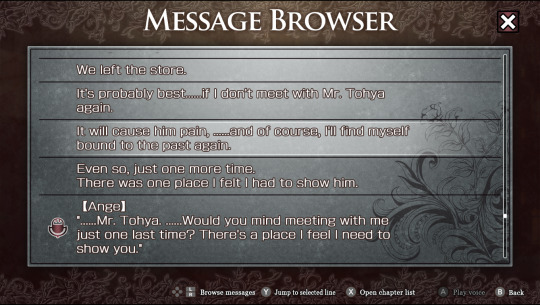
I am a little relieved it is an entirely different Gospel House, the original was kind of fucked up, but this is a house for children to learn of magic. Ange reveals that not only is this a replica of the Ushiromiya Mansion hall, but it's the same as EP8's Halloween party... certainly showing the Battler inside Tohya that he can rest easy with everyone else now.
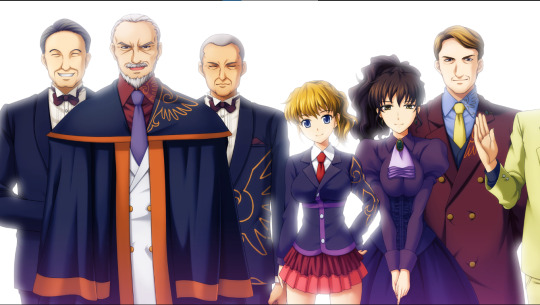
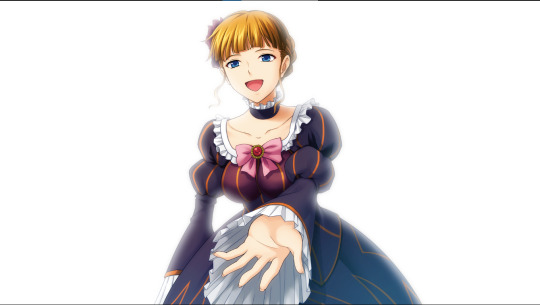


Battler is back home, Ange and Tohya can keep living in the future with no regrets.
Man, I really don't know what to say. I have already said so much but it still feels like I have so much to learn from Umineko. Umineko and Higurashi have meant so much to me across the years and I am so glad my replay led to me loving this experience more than I did. I hope one day I can revisit the game in Japanese, I am on classes and I want to come back once I am good enough to read this. That's uh, very far in the future though. I still have a lot to say and I will make more posts about my general thoughts once I finish reading all the side content. For now, I will say this replay made me appreciate a lot more how carefully handled the mystery was, and how it made me appreciate the answer arc in a lot of new ways.... first time I thought ep5-6 were one of the weaker arcs and now I think they are among the strongest. It's kind of funny though, I don't really feel the finality I feel when ending a lot of games. I still have so much more to learn about the world of Umineko and When They Cry, so finishing a game doesn't feel like an ending but just a step toward understanding more. This blog has mostly just been a tool for me to force myself to think a bit deeper into scenes than usual, via forcing myself to write down my thoughts. It's a little embarrassing but it has been a fun thing to do. I will probably keep doing it in the future, and I hope doing this will help me improve myself if only a little bit.

8 notes
·
View notes
Text
You're Just Like Quicksand
Fandom: DC Comics, Batfam, Batman Beyond
Summary: Jason Todd is ready to go into semi-retirement after fifteen years working with troubled youth, but one case in particular forces him to confront the sins of his youth and painful memories from his past.
Chapters: 4/?
Characters: Jason Todd, Terry McGinnis, Warren McGinnis, Mary McGinnis, Matt McGinnis, Bruce Wayne, Original Character(s)
Relationship(s): TBA
Additional Tags: Protective Jason Todd, Good Sibling Jason Todd, Retired Jason Todd, Multiple POV, Hurt/Comfort, Parent-Child Relationships, Canon Divergent AU, Angst, Mourning Jason Todd
Chapter Four: No Man's Land (Terry McGinnis' POV)
I sat across from Jason, working on my history paper, struggling to write the page on how that applied to Gotham today. Jason sat behind his computer, transferring files using the scanner. “You look like you’re stuck on something. What’s up?” Jason asked without looking up.
“You were a kid during No Man’s Land, right?” I asked.
“I was in a coma, so I wouldn’t be much help there,” Jason answered. “I have a brother who was alive during that time… When’s the paper due?”
“Rough draft’s due Thursday,” I replied.
Jason checked his watch and pressed three buttons on his office phone. “Hello?” a man’s voice answered.
“Bernie? Bern, tell Tim to come to the phone. One of my kids has a few questions for a homework assignment. Let him know he doesn’t have to speak to me if he doesn’t feel like it. This is for the kid,” Jason stated. He pushed his hair back, shutting his eyes as he breathed through his nose.
“I’ll get him… Wait a second, okay?” the man whispered.
“Who’s Bernie?” I asked.
“He’s my brother-in-law… He’s a good guy. Phenomenal cook. My kids love him-. Loved… They loved him,” Jason mumbled.
“Jason, what’s this about?” a stern voice questioned.
Jason looked at me. “I’ve got a student here who needs to interview a person from Gotham who was alive during No Man’s Land,” Jason explained, “I was in a coma, but I figured you might remember something about that time.”
“I do… How’re you doing? Kenny came home from school last week and asked about you,” Tim whispered.
“Did he get my gift?” Jason questioned.
“He did. I think he’d rather see his uncle… And despite our problems, I see no need in you avoiding Ken. He adores you-.”
“You’re on speaker, and I-. You know why I stay away… Tell him I love him, and I’m proud of him,” Jason interrupted, “No more small talk, okay? The kid’s paper is due on Thursday… And I’m sure it’ll take time for him to take notes today.”
Tim cleared his throat. “Okay… Fine. Hi, I’m Tim, Jason’s younger brother,” Tim introduced himself.
“I’m Terry. I guess you could say I’m a client of Jason’s… Are you busy?” I asked.
“Not particularly busy… Jason called the right person. I was in Gotham when it started, and my dad pulled me out to keep me safe,” Tim explained.
“Let me see your history book for a second,” Jason whispered. I passed him my tablet, and he read the pages to himself. “This is Tim. He’s right here.” Jason showed me a billboard of one of the missing kids in Gotham.
“That’s your brother?” Terry asked.
“Jason, don’t tell him that-.”
“Yeah, the search for him was like a nationwide incident-.”
“Okay, Terry, you had questions about that specific time, right?” Tim asked.
Jason gestured for me to answer him. “Tim doesn’t bite. He’s harmless,” Jason joked. I grinned.
“Tim, how old were you at the time?” I questioned.
“I was fifteen,” Tim answered.
Jason typed something into his personal phone. “Can you describe life in Gotham before, during, and after?” Terry asked.
Tim described Gotham as a crime-ridden city with a system of order kept neat by vigilante justice and police work before No Man’s Land (NML). During NML, the only system was that of criminal persuasion. The government abandoned the people, who were forced to fend for themselves against the different factions of super-powered and gimmicky criminals in their respective areas. Tim snuck into Gotham after it’d been shut off and got stuck there. When he returned home to Gotham after everything opened up, Tim’s dad enrolled him in boarding school. “A lot of us didn’t adjust well to being back in Gotham, and tons of kids, including myself, didn’t finish high school,” Tim replied.
“What did you do?” I asked.
Jason stood up, leaving me in his office alone. “Family business… But Gotham saw the problem in the school system and made it easier for kids to go to school and get their GEDs, go to college, and do whatever they had to to get on their feet,” Tim replied.
“Thanks for the help,” I smiled, “I-. Is Jason by himself a lot?”
“Jason, isolates… It’s what he does. He’s-.”
“Dad, is that JT?” a voice in the background questioned.
“I’m talking to one of his protégés,” Tim answered.
“Tell the kid to tell JT that ice cream’s on the house,” the voice replied.
“Okay, Kenny… I will. Now, make sure your father doesn’t cause a three-alarm fire making pizza again,” Tim warned him.
“Can do… Pop! You don’t need to put gasoline in a wood burner!” the voice yelled.
“That’s my son… Um, how old are you?” Tim asked.
“Fourteen,” I answered.
“He wouldn’t have called me had it not been for you… Jason must really like you. I haven’t heard from him in years. So, it was nice to hear his voice today. He almost sounded happy,” Tim whispered. His voice was soft. “I’ve gotta go. It’s dinnertime, but I want you to know it was a pleasure speaking to you, and I hope you get an ‘A’ on your history paper.”
“Thanks, Tim… And I’ll pass along your son’s message. Bye,” I replied.
“Bye, Terry.”
Jason returned with pizza and a large to-go container of fries. “Your dad texted me. He’ll be home late, so you’re having dinner with me. I hope you don’t mind pizza, breadsticks, and french fries. I didn’t plan on eating dinner tonight,” Jason stated without thinking. “Did I-? I meant-. I planned on having a drink, a piece of cake, and going to bed. Did Tim give you all the info you needed for your paper?” He seemed frazzled.
I nodded. “Someone wanted me to give you a message. I think it was your nephew,” I mumbled. Jason shook his head.
“No… It’s okay. Don’t tell me,” Jason whispered. I wrung my hands. “I’m not upset with either of you. It makes things easier when I don’t hear from the kids. That includes Ken… He’s my favorite, so that makes it even harder.”
“Oh… I almost forgot to say I watched your cage match against Michael ‘The Meat Grinder’ Gallucci. I had to watch it like ten times. How’d you do that so fast?” I asked. I had to change the subject. And well… He owed me a story.
Jason ate a fistful of fries and pushed the to-go plate my way. “Mm… That was my first match, but it wasn’t where the move originated. My oldest son was the first one to do the Thunderclap. He was eight, and we were play-fighting on the living room floor when he put his hands together, swung back, slapped me on one side of my face, swung, and hit me on the other cheek. I was so stunned-. I think he was too. He didn’t mean to hit me. I think he forgot it was only a game,” Jason replied. I don’t think he was convinced. He knit his brows together, a pained expression painted by the wrinkles in his brow and the tightness of his lips. I wondered what bubbled beneath the surface of his mind. Jason was interesting. Sad… But interesting. “You gave me a look.”
“I-. Jason, can I be honest with you?” I questioned.
“I’d like that,” Jason replied, “Don’t pull punches. I can take it.”
“He hit you, but he didn’t forget you were playing… He got carried away, didn’t he? He had a history of getting carried away-.”
“He did, but he was my little boy, and I loved him. Something in him was just-. Terry, there are things you’ll never understand in life until you experience them for yourself. I hope you never have to experience that, though,” Jason interrupted, “But you’re right. I covered over the truth. That was a great observation. I don’t mind being caught in a lie, so you can call me out as much as you like. No hard feelings.”
The truth. So, I felt compelled to give him the same heartfelt honesty. “Your son was lucky… I-. My dad loves me, but sometimes I can tell he doesn’t understand me. Sometimes I feel like a stranger to him,” I mumbled, “Maybe there’s something wrong with me.”
“I don’t think so… I don’t think parents and children are meant to understand each other… I think we’re meant to love each other despite the mystery. It’s easier to understand a complete stranger than to comprehend how a human you brought into existence, whose little face you washed and watched grow-. You wonder why they’re so different,” Jason whispered. His voice was soft and broken. It made me miss my dad. “Warren loves you more than most dads ever love their sons. I don’t know… It might be a psychological thing. Most dads hate their sons, but he adores you.”
“That’s nice to hear,” I replied.
“It’s the truth,” Jason stated. We both reached for a slice of pizza at the same time. “You remind me of myself, Terry… When I was young, I could’ve been anyone or anything. Don’t become one thing, Terry. You owe yourself more than that… Because once you trap yourself in one thing, it’s all you ever get. There’s no escaping it.”
“Did you get trapped in one thing?” I asked.
“Yeah, and I’ve spent my whole life trying to escape the ramifications of one misstep I made when I was fifteen,” Jason replied. And that stuck with me.
#fic#yjlq fic#Jason Todd#Terry McGinnis#Warren McGinnis#Mary McGinnis#Matt McGinnis#Bruce Wayne#Original Character(s)#Protective Jason Todd#Good Sibling Jason Todd#Retired Jason Todd#Multiple POV#Hurt/Comfort#Parent-Child Relationships#Canon Divergent AU#Angst#Mourning Jason Todd#batfam#batman beyond au
7 notes
·
View notes
Text
Germanic first names
In Northern and Western Europe exist two major name groups. Christian names (Greek/Latin) and Germanic names. Most Christian names are derived from saints and apostles, such as Johannus (John, Hans, Johan, Janus). Their meaning is often based on what the saint/apostle represents.
Germanic names consist of many sub-language forms, with many names originating from titles, pet names and even descriptions of character. Animal related names were popular, such as Bernhard or “As tough as a Bear”. It is possible that a person could change names throughout their life by achievements, rank in society or skills. Theodorik of Bern was probaply not “King of the People” when he was born, but took the name during his life.
Anyone from English, German, Frisian, Nordic descent has a possibility of having a Germanic name with similar versions existing in these languages. For example “leader” in Old Norse (Akar), Old English (Aca), Old High German (Ahho), Low Franconian/Low Saxon (=predecessor of Dutch) Aka.
Sources in Dutch:
Taaldacht.nl
Meertens Instituut
Digitale Bibliotheek voor de Nederlandse Letteren (DBNL)
#frankish#merovingian#viking archaeology#archaeology#carolingian#charlemagne#field archaeology#viking mythology#merovingian archaeology#germanic mythology
24 notes
·
View notes